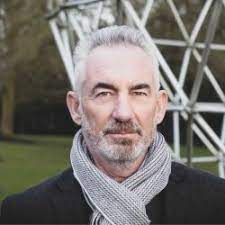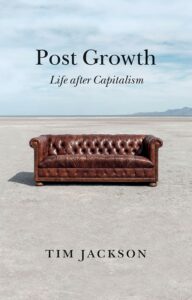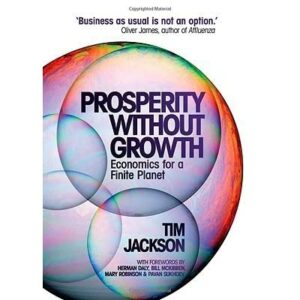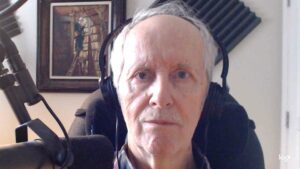From the UK, Professor Tim Jackson talks about his new book “Post Growth: Life After Capitalism”. Lorenz Keysser from ETH Zurich takes it further: planned decline coupled with increasing well-being – degrowth. Stock markets, banks, every business – everybody wants to grow more and buy, buy, buy. Will we wait for the great collapse, or plan our way back down the mountain?
Listen to or download this Radio Ecoshock show in CD Quality (57) MB or Lo-Fi (14 MB)
PROF. TIM JACKSON: GOOD LIVES DO NOT HAVE TO COST THE EARTH
The pandemic, jobs crash, weird politics – these are strange times. If we are all twisting into a new society, can it be better?
Right up to the minute, out comes a new book from respected economist Dr. Tim Jackson. It is called “Post Growth: Life After Capitalism”. Tim Jackson is Professor of Sustainable Development, and Director of the Centre for the Understanding of Sustainable Prosperity. After serving as economist advising the UK Government on sustainability, Tim’s book “Prosperity Without Growth” made a few people cranky. Oh, Tim’s other hobby is writing popular plays for the BBC.


Professor Tim Jackson
Listen to or download my half hour Ecoshock interview with Tim Jackson in CD Quality or Lo-Fi
OR Watch the Tim Jackson interview on YouTube
This book is not what I expected. There are no formulas and balance sheets in here. You are an economist (for God’s sake). I wanted a solution for the future! Instead we find a box of lives and meaning. But as Tim explains in the book and the interview: lives with meanng is what “economy” should really be about. In my view, as we are drowning in bleak prospect, Jackson operates like the gentle physician. He has a positive vision of what life could be like without wrecking the world, but as we dive deeper, he does not hide the deep problems of our current ways of life.
Tim’s new book “Post Growth” feels like one of those fire alarms with a glass door and a little hammer hung on a chain. “Break open in case of fire”. Now after an economy-wrenching, heart-breaking pandemic, and nothing done about climate, the alarm is going off and it is time to wake up. We repeatedly fail to respond. Are we stuck in a state of shock?

We discuss how strange it is that Presidential Candidate Robert F. Kennedy talked about boring Gross National Product to a hall full of college students in Kansas in 1968. Why would he do something so out of place? In the full one hour version of Radio Ecoshock, I a found recording of Kennedy’s talk in ’68 at the end of the show. In his speech, GDP is not boring, but a signal of social problems we need to fix.
After being the Economist on the UK Sustainable Development Commission, Jackson has a serious reputation in the UK and globally. Colleagues are slowly coming round to Herman Daly’s view that the economy is “a ‘wholly owned subsidiary’ of the environment”, and that growth cannot be infinite on a finite planet. Daly, who is in his 80’s now, proposed the “steady-state economy”. Our next guest, Lorenz Keysser, goes further, saying the economy must shrink. But the word “degrowth” is hardly mentioned in Jackson’s book, appearing only in end-notes and references.
BIOLOGY AND ECONOMICS – BOTH STUDY LIFE
The early work of agricultural economist Herman Daly was a big influence for Tim Jackson, especially “Economics as a Life Science”, published in the Journal of Political Economy in May 1968.
“… ultimately economics and biology were both engaged in the study of one and the same thing: the life process itself.”
(Jackson, Post Growth, pg 11)
Daly created “ecological economics”. Seeing inevitable limits to growth, in the early 1970’s Daly began to explore the “steady state” economy with “a constant stock of capital and a constant population. Crucially, the size of this constant stock had to be small enough that the flow of material and energy need to maintain it lay within the carrying capacity of the planet.” (Jackson pg 12). More than a century earlier, the economist John Stuart Mill explored the steady state. Mills published “Principles of Political Economy” in 1848. Mills thought a steady state economy would enrich people’s lives rather than impoverish them. Jackson draws a line from J.S. Mill through RF Kennedy to Herman Daly – and this new book.
Jackson says his book is “An appeal to economists to understand that the economy is not a separate or even separable part of the natural world, but a ‘wholly owned subsidiary’ of the environment.”
“By pulling apart the assumptions coded in capitalism and reframing the underlying propositions, I aim to reconstruct the foundations for a postgrowth narrative”.
The UK Sustainable Development Commission culminated with a report led by Tim Jackson that became a well-received book: “Prosperity without Growth”. Well, the world public like it, even though there were voices within the UK Government and business establishment that were not ready for it. Maybe they are closer now?

Except for a small group of multi-billionaires, it looks like we have neither prosperity or growth. Millions feel shut out. I wonder, do we still have enough social capital left to plan a new economy, or will things just spin out of control into hardship and the unknown? Wall Street and the City are riding high these days. Billionaires rise into stratospheric wealth. Isn’t it a bit early to be writing about “Life After Capitalism”? Of course says Tim. Capitalism is still alive and kicking. But it needs severe modifications if we are all to survive in a habitable world. We need to start thinking about what the next stage could be like – as Jackson does in this new book.
As Jonathon Porritt reported in his 2020 book “Hope in Hell” – the same government who utterly failed to contain a dangerous new virus also blew any pretense of preventing extreme climate change. Where is the Post-Growth world going on climate?
I loved the quote from Ernest Becker, the existential philosopher in Tim’s book. This could be the theme for my work on Radio Ecoshock as well. Becker says:
“What we do here has to be done in the lived truth of the terror or creation, of the grotesque, of the rumble of panic underneath everything. Otherwise it is false.”
Over and over in the book, I catch a duality in Jackson. There is a battle between daring to dream big visions and a voice saying “never forget the beasts within”. Jackson tells us: “A part of my aim in this book has been to seek insight into the human condition from the ghosts in the mirror.” That is why he calls up the dead as witnesses to this strange time, after the pandemic, and before anything else. That is why we need those almost forgotten voices from history.
Find links Tim Jackson and his work at timjackson.org.uk
In 2010 Tim delivered a TED talk titled “Tim Jackson: An economic reality check”. It has over 200,000 views on YouTube, and even more through the various TED platforms.
===============================================================================================
IS RADIO ECOSHOCK EXPERIENCING DEGROWTH?
My special thanks to those supporters who donate each month to keep Radio Ecoshock going. Like many non-profits and independent producers in these difficult economic times, donations are down. That puts extra pressure on me personally as I keep going, producing these free programs on serious topics. If you can help, please “subscribe” for a monthly donation, or make a one-time donation. I need more financial help at this time.
Best, Alex
Radio Ecoshock
===============================================================================================
IS THIS THE ANSWER? DEGROWTH WITH LORENZ KEYSSER
“We are at the beginning of a mass extinction and all you can talk about is money and fairly-tales of eternal economic growth. How dare you?”
That was Swedish climate voice Greta Thunberg at the United Nations in 2019. Greta is upset that adults are coasting toward a hot, dangerous world for the next generations to come. It is not just climate change, but species disappearing, while pollution and billions more humans fill the former natural world. Scientists and experts talk about it every week on Radio Ecoshock. But is there a way out? If you don’t want to believe in fairy-tale technology to solve it all, this interview covers the single best solution I have heard. It is hard and crazy but it just could work. It is called “Degrowth”.
Can we humans plan to avoid a catastrophe of our own making? Shall we redefine the future or wait until disasters rule us? A reduction of human numbers and impacts seems inevitable either way.
Two young scientists look at the pathway that the United Nations and national governments refuse to consider. Manfred Lenzen is Professor of Sustainability Research at the University of Sydney. His partner and Lead Author is Lorenz Keysser. Lorenz specializes in Environmental Systems and Policy at ETH Zurich. They explain the challenges and need for Degrowth to really keep global climate change below 2 degrees C.

Lorenz Keyßer, ETH Zurich
Listen to or download my 26 minute interview with Lorenz Keysser in CD Quality or Lo-Fi
For a while, Degrowth was a bigger movement. In 2010, I recorded and broadcast a Degrowth conference in Vancouver. Find some of those speeches posted below. There were international conferences in Paris and Barcelona. Then we heard less, but now degrowth is rising again.
The only climate organization recognized by governments is the Intergovernmental Panel on Climate Change and the so-called Conference of the Parties. Neither of these ever considered or studied Degrowth as part of the big solution for global warming.
“None of the 222 scenarios in the IPCC SR1.5 and none of the shared socioeconomic pathways projects a declining GDP trajectory, as is examined by the expanding degrowth literature.”
– Lorenz et al, Nature Communications, 2021.
In 2020, eleven hundred experts and over 70 organizations from 60 countries published a letter calling for Degrowth – as the way forward from the COVID-19 crisis. Instead, a lot of governments announced huge spending to restore the growth economy. Also see this June 2020 Perspective in Nature Communications “Scientists’ warning on affluence” with Manfred Lenzen and Lorenz T. Keyßer as co-authors.
“NORMAL” IS DISASTER NORMAL
Before the pandemic struck, this civilization was already driving hard toward collapse for a long list of reasons. Now I hear politicians and media commentators promising a return to “normal”, which is disaster normal. How can we communicate the possibilities of a simpler life, stepping lightly on the Earth? We could argue that science is currently a discussion among those in power, and their affluent populations. Degrowth depends on social justice and bottom-up movements to develop. To be feasible, does the Degrowth movement need social unrest – or does it actually require revolution?
The new paper led by Lorenz is titled: “1.5°C degrowth scenarios suggest need for new mitigation pathways” – as published in Nature Communications, May 11, 2021. It is not an easy paper, but it’s great work figuring a way to the future we need, despite complex human possibilities.
“Here, research shows that in principle it is possible to achieve a high quality of life with substantially lower energy use and GDP.”
– Lorenze et al Nature Communications 2021.
Lorenz is also co-author of the German-language book ‘Ohne Flugzeug um die Welt’ about his no-fly journey to Australia and back. There is an English-language blog about that overland to Australia journey here. It could be the new no-fly way to get places.
Find out more about Degrowth here. And here is a history of the development of the ideas behind degrowth (which include well-being). Canadians can tune into Degrowth here. And check out this blog “Rethinking Prosperity”.
================================================================================================
RADIO ECOSHOCK ON DEGROWTH – FROM THE ARCHIVES
DEGROWTH – Planned Contraction
Posted on May 13, 2010, by Radio Ecoshock
If you go over our past programs, you’ll find dozens that lead to degrowth. Like Cecile Andrews on the “Simplicity Movement”. You can listen to this talk by Cecile Andrews, as broadcast on my early Vancouver CFRO radio show “Brown Bagger” (lunch-time speeches with a conscience).
I suspect most Ecoshock listeners, when they investigate degrowth, will feel like they are coming home. Finally, a name for what we know.
On April 30th, 2010 I attended and recorded one evening from a three day conference on Degrowth. It was historic, the first such gathering in North America.I start with a brief introduction by conference host and author Rex Weyler, a founder of Greenpeace, a member of the Vancouver Peak Oil Executive, and now the Degrowth movement. We also get a short impression of the Barcelona Conference, from Tom Walker. We also hear clips from Conrad Schmidt, heat of the Work Less Party, and York University Professor and no-growth advocate Peter Victor.
Download these speakers from the 2010 Degrowth Conference: Part 1 (29 minutes). Part 2 (29 minutes).
———————————————–
Posted on June 30, 2011
You hear two panelists from a recent De-Growth conference in Vancouver, Canada. Our speakers are Conrad Schmidt from the Work-Less-Party, and Dr. Bill Rees, the co-inventor of the ecological footprint concept – selection from the Vancouver Degrowth Conference June 3, 2011.
Thank you for listening – and don’t forget to make a donation to help keep this good thing going.
Alex
